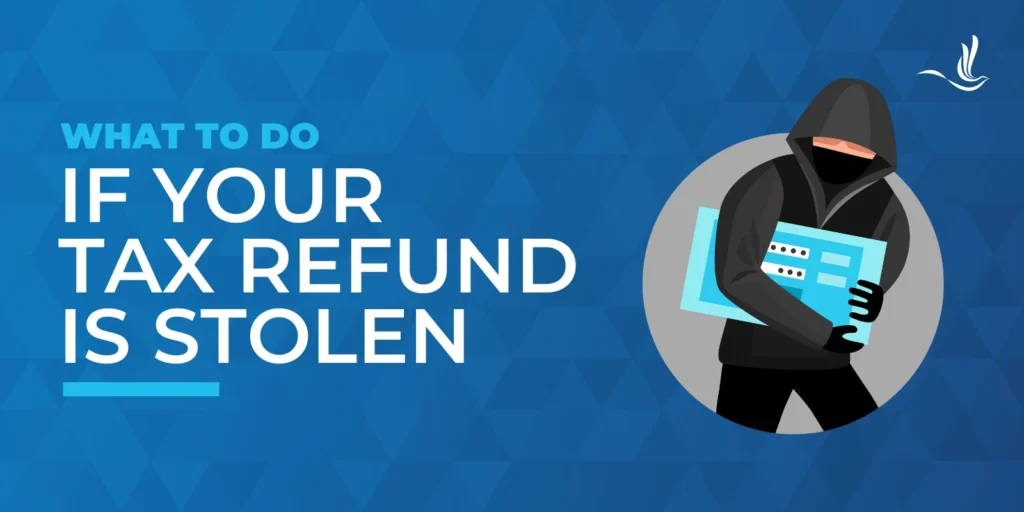
Tax season is a time of anticipation for many individuals, with the hope of receiving a tax refund. However, the unfortunate reality is that tax refunds, like any valuable document, can be vulnerable to theft. If you find yourself in the distressing situation of having your tax refund stolen, it’s crucial to take swift action to minimize potential losses and protect your finances.
How Can Thieves Steal Your Tax Refund?
Thieves can employ various tactics to steal your tax refund, ranging from sophisticated identity theft schemes to opportunistic acts of theft. Here are some common methods that thieves may use:
Identity Theft
Identity theft occurs when someone obtains your personal information. This can include your Social Security number, date of birth, without your consent. Armed with this information, thieves can fraudulently file a tax return in your name and claim a refund. They may also use stolen identities to intercept tax refund checks or direct deposits.
Phishing Scams
Phishing scams involve fraudulent emails, phone calls, or text messages that appear to be from legitimate organizations, such as the IRS or tax preparation services. These messages often prompt recipients to provide sensitive information.
Mail Theft
Tax refund checks and other sensitive documents sent through the mail are vulnerable to theft if they are intercepted by criminals. Thieves may target residential mailboxes, community mailrooms, or postal drop-off locations to steal mail containing tax refunds or other valuable documents.
Data Breaches
Data breaches occur when cybercriminals gain unauthorized access to databases containing personal information, such as those maintained by government agencies, financial institutions, or businesses. In some cases, thieves may exploit data breaches to obtain individuals’ tax-related information. They may then use it to file fraudulent tax returns or intercept tax refunds.
If Your Tax Refund is Stolen, Act Immediately
Discovering that your tax refund has been stolen can be alarming, but it’s important to remain calm and act promptly. However, note that you must wait a reasonable amount of time before contacting the IRS about your stolen refund. If you opted for direct deposit, you’ll need to wait until 5 days after the usual 21-day period. If you opted for a paper check, you will need to wait six weeks before contacting the IRS. After these waiting periods, here’s what you should do.
Report the Fraud
Your first step should be to report the fraud to the Federal Trade Commision via IdentityTheft.gov. In addition, you may need to file IRS Form 14039, Identity Theft Affidavit. This notifies the IRS that your identity was stolen to file a phony tax return.
Notify the IRS
You can ask the IRS to trace your refund by calling their Refund Hotline at 1-800-829-1954. This hotline is specifically for those who file as single, married filing separately, or head of household. If you file jointly with your spouse, you will need to complete Form 3911, Taxpayer Statement Regarding Refund via mail.
If you chose direct deposit, your bank will receive a letter within six weeks from the Bureau of Fiscal Service to verify where the refund was sent. Paper check refunds work differently. If the check has not been cashed yet, you’ll simply receive a replacement within six weeks. However, if the original check was fraudulently cashed, the Bureau of Fiscal Service will send you a claim package within six weeks. It will then be up to them to determine if the check was forged and notify the IRS if a replacement check should be sent to you. If they deny your claim, you may appeal.
Protect Your Identity
Tax fraud and scams only get more sophisticated each year, so safeguarding your identity is more important than ever. One of the ways you can do this is to get an Identity Protection PIN (IP PIN). This six-digit number prevents thieves from filing a tax return with your Social Security Number (SSN) or Individual Taxpayer Identification Number (ITIN). IP PINS must be renewed every year for added security. If your identity is stolen, you should also update your passwords as the thief could’ve obtained this information. Be sure to use strong passwords and avoid using the same password for all accounts. Finally, always be on the lookout for scams aiming to steal your identity. Never interact with suspicious calls, emails, texts, or other forms of communication.
Tax Help for the 2024 Filing Season
Discovering that your tax refund has been stolen can be a distressing experience, but prompt action and vigilance can help mitigate the potential impact. By reporting the theft and securing a replacement check, you can safeguard your finances and minimize the risk of identity theft. Additionally, taking proactive measures such as opting for direct deposit and securing your mailbox can help prevent future incidents of theft. Remember, staying informed and proactive is key to protecting yourself against financial fraud and identity theft. Optima Tax Relief has a team of dedicated and experienced tax professionals with proven track records of success.
If You Need Tax Help, Contact Us Today for a Free Consultation